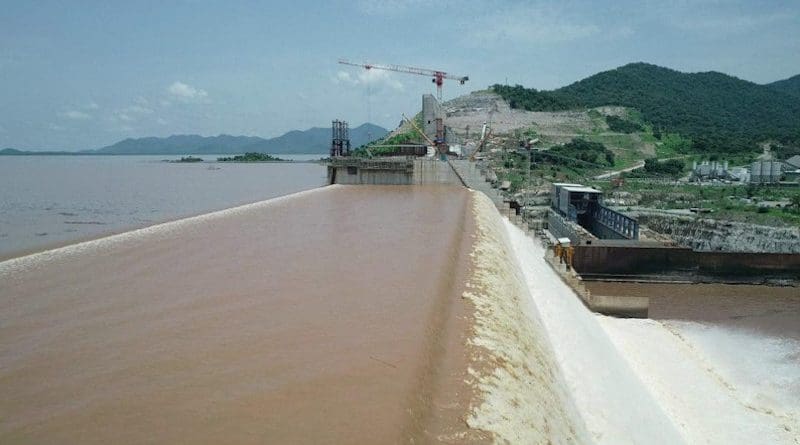Egypt Stresses Need For Binding Deal On Renaissance Dam
By Arab News
By Mohammed Abu Zaid
During a meeting with UN Secretary-General Antonio Guterres in New York, Egypt’s Foreign Minister Sameh Shoukry reiterated the need to reach a binding legal agreement on the operation and filling of Ethiopia’s Renaissance Dam in a manner that takes into account the interests of all parties.
Egypt describes the dam as an existential threat because it suffers from water scarcity and receives 95 percent of its water needs from the Nile. Egypt fears that the process of filling the dam will affect its share of the river’s water.
Since 2011, Egypt, Sudan and Ethiopia have been negotiating an agreement on filling and operating the dam, which is intended to be the largest source of hydroelectric power generation in Africa. However, all negotiating attempts have failed.
Shoukry said there is no specific date for the resumption of talks, and the three countries are waiting to hear proposals from the Democratic Republic of the Congo, the current chair of the African Union.
He added that during his meetings in New York, he was keen to highlight Ethiopia’s “stubborn” position on the crisis.


Ethiopia does not recognize the 1959 treaty signed by and between the Sudan and Egypt. This treaty allocated all the Nile waters for only the two countries – the Sudan and Egypt. No other upper riparian country recognizes this treaty. It is a waste of time for the two downstream countries to try to continue to use all of the Nile waters for only themselves. For this reason, Ethiopia shall continue filling the GERD at the time of its choosing and there is nothing these two Arab countries can do about it. The UNSC has no mandate on water allocation and it has clearly stated it in its statement. So, the UNSC presidential statement does not have any meaningful legal relevance at all.
If the two countries try a military solution, then they will be signing their own people’s death warrant. Ethiopian engineers and security have already contingencies for this kind of madness. Diversion locations have been identified and in the event of a military attack the river course will change forever and there won’t be a drop flowing to the two countries. And the two countries know all of this.
The only solution for Sudan and Egypt is to negotiate in good faith and drop the stale and useless “historical right” that they have been lamenting about. Ethiopia is continuing with its scheduled work on the GERD and it is up to the two countries to come to their senses.
Ethiopia will never accept the 29/59 like colonial bondage over Nile waters. But, here is my advice for the two downstream countries, renounce your colonial master’s inequitable treaty all problems solved. Twisting the issue of #GERD to UN, EU, UNSC, and Climate change doesn’t help us to arrive at what we aspired.
Cooperation
Integrity
Mutual benefit would be out guidance.
Sad, I don’t think 🇪🇬🇸🇩 on the track of cooperation, integrity and mutual benefit, rather they try to sustain the colonial legacy which is absolutely unacceptable by 🇪🇹.
#GERD is my dam
#Nile is ours.